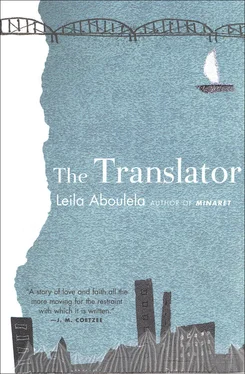But she still dreamt of him. Vivid dreams in which he brushed past her, close, close enough for her to smell him but he would not look at her, would not talk to her. In one dream she was as short as a child in a room full of adults and smoke. She was in this room to look for him and she was standing near a table that was large and high. On tiptoe she saw that the table was green, a solid rectangular green with no cutlery, no food or drinks. She reached with her hand and it was as if the table was a shallow box lined with green rough wool. On the other side of the table Rae was talking to a man she did not recognise, a man with glasses and straight black hair sliding over his eyes. The room was choked with people bigger than her, older than her. Their discontent buzzed through the room, through the smoke, and, like in the other dreams, Rae came towards her and then brushed past her, distracted, unaware of her because she was too young and too short for him.
Raw eyes in the morning, the way a dream affects the day ahead. The ceiling fan rotated slowly distributing the breeze that came from the window. The birds were strident outside. The way a dream threatens the day, sharpens a memory. Only a dream and it could induce nausea in her, a dry soreness behind her eyes.
She poured sour milk in her aunt’s tea and had to make another cup. She sent Amir to school without making him brush his teeth, left the fan running in the empty bedroom all morning. At work she felt that she didn’t care, it didn’t matter at all that her adult students could barely read and write. The illiteracy rate was 60 or 82 per cent depending on who was right, and today she had no energy or desire to reduce it.
‘What’s wrong with you? Are you tired?’ she was asked. ‘Sister, please raise your voice we can’t hear you.’ It was women’s classes in the morning: mothers, grandmothers, today instead of reading, a health lesson about breastfeeding. The reading syllabus was set by a government commission and because of the shortage of books, children’s school books were used. The same books from which Dalia and Amir were taught. I am a girl. I come from the village. I am a boy. I come from the village. This is a camel. These are dates. It was humiliating to learn from such books. She could feel it in their voices, a kind of edge, the men (who made up the majority in the evening classes) more so than the women, who would laugh it off, saying, ‘Now I can read my children’s school books.’ For this reason health topics and community education lessons were more successful. It was lucky for her that on the day she was least motivated, the topic was the popular one of feeding babies.
‘You left the fan on in the bedroom all morning,’ said her aunt, the now familiar contempt in her eyes, her voice a certain way, wanting war. They were her first words when Sammar, Amir and Dalia came home. Dalia sucking a lollipop given to her by a friend, Amir trailing his school bag, pretending not to be envious. Sammar took off her sunglasses, poured herself a glass of water from the fridge. She sat on one of the children’s stools in front of the blowing air cooler, put her glass of water on the coffee table. There was condensation on the glass because the water was cold.
‘I’m sorry,’ she said. She could not say that it was because of the dream. Everything going wrong because of the dream. She started to drink her glass of water. Nile water beautiful after thirst, alhamdulillah.
‘Electricity isn’t free,’ said Mahasen. She was sitting on one of the beds putting Hanan’s baby to sleep, patting him on the back as he lay on his side facing the wall. Hanan was still at work. She worked longer hours than Sammar, she was more productive, more efficient. The baby raised his head up and smiled at Sammar. She smiled back, mouthed his name silently. Mahasen patted him harder. ‘Come on, sleep!’ she said to him.
Sammar felt that her aunt wanted to say more, that there was more to come after the statement ‘Electricity isn’t free.’ She escaped, went to the bedroom to change, then called Amir to give him a shower so that he could be clean before he ate. He talked to her while she towelled and dressed him but she was not listening, her mind numb behind her dry eyes, the fear that she was somehow not going to able to complete the day, that it was too long, too much of a challenge. Even when she prayed she still felt a tightness inside, a sense of foreboding.
The main meal of the day served as usual and Hanan’s twins were brought down by their father, who went upstairs again. The children sat on the stools around the table. The clutter of plastic dishes, murmurs from her, ‘Say bismillah before you eat. Be good and finish your plate.’ They were sometimes lively, sometimes quiet. Today after the first few mouthfuls it was as if devils danced around the house, skipped on top of the furniture, goaded the children. Rice scattered everywhere, there were screeches, fights, rice grains in noses and ears. Amir pinched Dalia, stuck his tongue out at her. Dalia bit Amir, leaving saliva, chewed rice and ridges on his arm. He pulled her hair, yanked it and she screamed, a scream so loud that it seemed incredible to Sammar, as she pulled them apart, that such a noise could come out of someone Dalia’s size. Devils danced around the room making everything a blur in front of Sammar’s eyes. Millions of children babbling away, the rattle and the din of plastic plates and she in the middle of it, immersed, hypnotised. Dalia’s scream woke the baby, his arms grasped the air, his face scrunched with anger, his own kind of screaming. Mahasen picked him up and started to rock him in her arms. If he did not have a proper nap, he was grumpy the rest of the day.
‘Make them quiet,’ Mahasen shouted. ‘Do something, Sammar, instead of staring at them like an idiot.’
But the children were wild, stronger than her. They rotated around the room, shouting, kicking. They ran too fast. At last Hanan appeared at the door like a hero, solid and in control, dignified in her dentist’s working clothes. She smacked Dalia, picked up her screaming baby and herded her messy twins upstairs. She left Sammar with Dalia whimpering and cringing, and a dull calmness all around the room. As if nothing had happened, Amir arranged his toy cars on the floor, talked to them and pushed them carefully from the carpet to the tiles.
‘All this is because you are useless,’ said her aunt. ‘A few children and you don’t know how to handle them. I don’t know what happened to you. In the past you were lively and strong, now you’ve just become an idiot.’
She wanted to escape from her aunt but Dalia was clinging to her, sticky and limp. She wanted to escape into cleaning the room, sweeping up the rice that was scattered on the table and on the floor.
‘You don’t even have a proper job, a job that pays. How much have you been contributing to the house?’
‘Not much,’ her voice flat, obedient, answering how Mahasen wanted her to answer.
‘And content to wear others’ clothes, without any pride.’
That was true. She had been passed on a whole wardrobe of Hanan’s, clothes that were too tight for her after having the baby, didn’t fit anymore. And it was also true, that she had no pride. The clothes, when Hanan offered them, had made her happy. They were loose on her, long. Hanan had been nice, she had said, as Sammar tried each thing on, looking at herself in the full length mirror, turning this way and that, ‘Everything looks lovely on you, Sammar.’ Now her aunt was making it all dirty, wanting her to feel ashamed.
‘You should go back to England, work there and send us things.’
‘I don’t want to go back.’
‘We buried the deceased and you went around saying, “It’s a good thing he left me with one child, not three or four, what would I have done with them?” A thing to say. It shows how low you are, with no manners, no respect for his memory. Now you have this one child and you don’t even want to take him to England and look out for his benefit.’
Читать дальше












